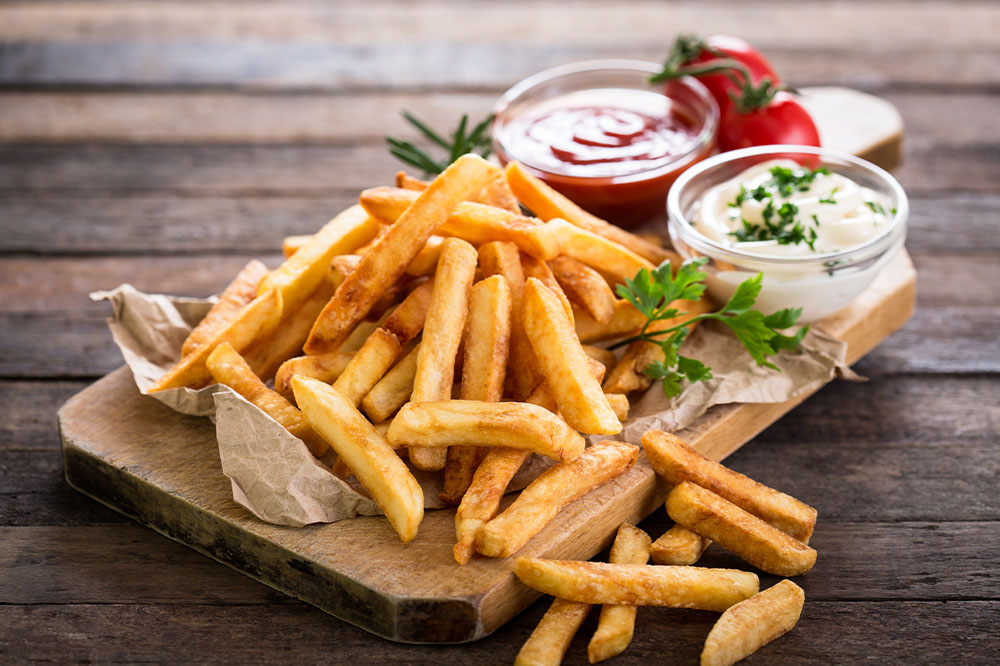7 worst foods for eye health

Nutritional choices can play a significant role in maintaining the health of organs, including the eyes. Further, due to the arrangement of vessels behind the eyes, issues with heart health can affect the eyes. So, choosing foods that are not heart-friendly and have low nutritional value can restrict the vessels from transporting vital nutrients and oxygen to the eyes. Such eating habits can degrade eye function, which may lead to problems with vision.
Foods to avoid
French fries
One often enjoys fried items at a fast food joint. But such food can be extremely unhealthy. Many batches of french fries are made using the same oil and reheated multiple times before being served. While this is cost-effective for the fast food joint, the fries undergo molecular changes, which increases the harmful fat content. These fats are known to affect the health of organs, including the heart and eyes. Further, fried foods contain free radicals that cause oxidative stress to the body and subsequently affect eye health.
Margarine
Margarine is often deemed the healthier version of butter as it is made using vegetable oils. However, margarine is rich in trans fats, which are known to increase bad cholesterol levels in the body. Elevated cholesterol levels lead to blockage in the blood vessels, resulting in a poor supply of blood, oxygen, and nutrients to the eyes. Regular intake of such fatty foods may also increase the risk of eye diseases. So, one could switch to oils derived from avocados, coconuts, and olives.
Processed meats
Foods like sausages, hot dogs, and bacon are common additions to meals in households across the country. Despite how convenient they are to make, processed meats contain a high amount of fats. Eating such foods regularly may result in the buildup of plaque in macular vessels, obstructing the flow of blood to the eyes and increasing the risk of diseases like macular degeneration. Processed meats also contain high amounts of sodium that may lead to high blood pressure (hypertension). Moreover, these foods may also affect other vital regions in the body, such as the heart. So, it is imperative for one to avoid or at least limit processed food to maintain eye health.
Frozen foods
One can find a variety of frozen food like pizzas and pasta on store shelves today. These meals come in handy when one has to make meals quickly and cannot spend more than a few minutes on the preparation. However, regular intake of frozen foods might be a cause for concern. Such products contain preservatives, salts, and sugars that could worsen eye health. Further, eating a lot of processed food could increase the risk of diabetes, which contributes to vision problems.
Store-bought condiments
One may add condiments, dressing, and sauces to food prepared at home to make it tastier and more visually appealing. However, store-bought dressings and sauces contain artificial sweeteners and salts to enhance flavor and preservatives that help extend their shelf life. Such products are also rich in unhealthy fats that could lead to macular degeneration when eaten excessively. To curb this risk, one could make their own salad dressing and sauces using fresh, nutrient-rich ingredients.
Coffee
Coffee contains caffeine, which gives an energy boost to work longer hours. However, some sources link the ingredient with multiple health complications, including the ones that may develop in the eyes. Regularly choosing caffeinated beverages might increase the pressure on the eyes. Those dealing with glaucoma or ocular hypertension (OHT) may worsen their symptoms with regular caffeine intake. Further, a sudden and excessive rise in pressure may lead to temporary or permanent loss of vision. So, one should avoid or limit the intake of coffee and other caffeinated beverages and opt for herbal teas and decaf drinks.
Sweetened beverages
Sweetened beverages, like soda and sports and energy drinks, contain at least 7 to 10 tablespoons of sugar per can. While the beverages could provide an energy boost, the excessive amount of sugar in them can put one at a greater risk of developing type 2 diabetes and heart disease. Both conditions can contribute to vision-related issues. Further, too much sugar may also increase the risk of age-related macular degeneration. So, one should avoid sugary beverages and foods as much as possible.